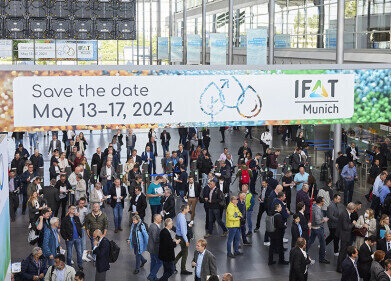-
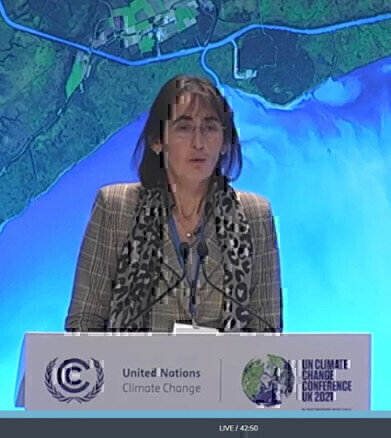 WBA Chief Executive Charlotte Morton
WBA Chief Executive Charlotte Morton -
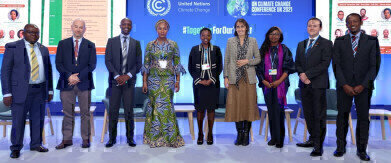 left to right - John Kioli, Chairman, Kenya Climate Change Working Group ; Dr Johan C.I. Kuylenstierna, Stockholm Environment Institute; Arnold Kipchumba, Kenya SLCP Project ; H.E. Hajia Samira Bawumia, Second Lady, Republic of Ghana ; H.E. Rachel Ruto, Second Lady, Republic of Kenya ; Charlotte Morton, World Biogas Association; Ruth Sego, ClimateWorks Foundation; Alex Marshall, Clarke Energy ; Tedd Moyo, Oxford Fellow.
left to right - John Kioli, Chairman, Kenya Climate Change Working Group ; Dr Johan C.I. Kuylenstierna, Stockholm Environment Institute; Arnold Kipchumba, Kenya SLCP Project ; H.E. Hajia Samira Bawumia, Second Lady, Republic of Ghana ; H.E. Rachel Ruto, Second Lady, Republic of Kenya ; Charlotte Morton, World Biogas Association; Ruth Sego, ClimateWorks Foundation; Alex Marshall, Clarke Energy ; Tedd Moyo, Oxford Fellow. -
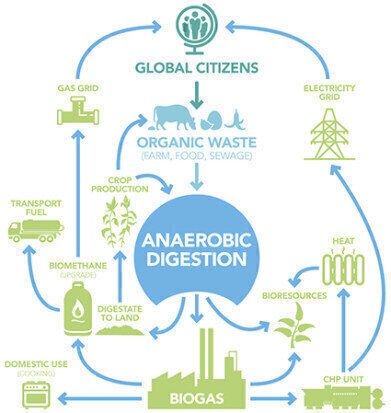 WBA organic waste diagram
WBA organic waste diagram -
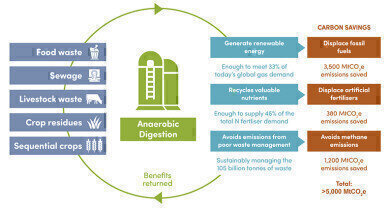 Figure 2 - Circular economy of organic wastes graphic
Figure 2 - Circular economy of organic wastes graphic -
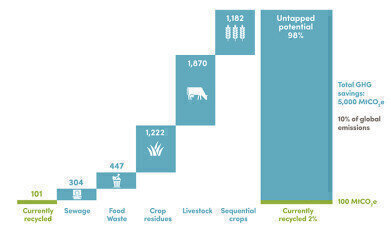 Figure 1 - Recycling breakdown graphic
Figure 1 - Recycling breakdown graphic
Waste Management
New era of waste management to reduce methane emissions needed
Nov 24 2021
The World Biogas Association (WBA) reiterated its key message to a full house of COP26 delegates at a session held in partnership with the Kenya Climate Change Working Group. The session took place in the exclusive Blue Zone of the global climate event in Glasgow earlier this month.
Charlotte Morton, WBA Chief Executive, said in her speech: "Organic wastes from food production, food waste itself, farming, landfill and wastewater treatment are responsible for about 25% of global methane emissions caused by human activity. However, today only 2% of these are treated and recycled [through anaerobic digestion], which means that 98% are [still] emitting methane (see Fig 1). It is therefore critical that we usher in a new era of waste management. We haven’t changed how we treat our waste for millennia. We either burn or bury it. That must change".
Earlier in the meeting, Dr Johan C.I. Kuylenstierna, Research Leader at the Stockholm Environment Institute, had explained how "reducing methane is the single most important thing we can do to protect ourselves from climate change in the near term. Methane is responsible for about 30% of warming and has a life of about 12 years in the atmosphere". Over that lifetime, methane (CH4) is 86 times more harmful than CO2 , - which is why over 100 countries have now signed up to the Global Methane Pledge committing them to reducing their emissions by 30% from 2020 levels by 2030.
By treating organic wastes, anaerobic digestion (AD) captures the CH4 they emit whilst transforming them into biogas, biofertilisers and other valuable bio-products that help decarbonise carbon-intensive industries such as heat, transport and agriculture. Global human activity generates 105bn tonnes of organic wastes annually - of which, as highlighted by Charlotte Morton, only 2% is being recycled through AD. "AD could deliver around 50% of the Global Methane Pledge targets and offers a circular solution that acts as a catalyst for circular economies across multiple sectors. (see Fig. 2).
"When waste becomes a resource, you start to see very little waste", she pointed out.
The health impact on populations, and especially women, of climate change and short-lived climate pollutants (SLCPs) such as methane and black carbon was vividly illustrated in keynote speeches by the Second Lady of the Republic of Ghana, H.E. Hajia Samira Bawumia, and the Second Lady of the Republic of Kenya, H.E. Rachel Ruto. Among other speakers, Arnold Kipchumba of the Kenya SLCP project, shared the startling 2021 World Health Organisation statistic that "4 million people die prematurely with SLCP-related illnesses and household air pollution", with rural communities in Africa being particularly affected.
In his presentation, Alex Marshall, CEO of Clarke Energy, showcased success stories from the biogas sector and highlighted that the company is already contributing to the avoidance of an estimated 17 to 20m tonnes of CH4 emissions globally every year.
In the concluding Q&A session and remarks, the discussion moved to the issue of creating a viable economic model for AD to fulfill its environmental potential. Whilst the technological solutions have been identified, "we need to find the solution to paying for what needs to happen", concluded the event's chair John Kioli, Chairman of the Kenya Climate Change Working Group.
Events
May 05 2024 Seville, Spain
May 13 2024 Munich, Germany
May 23 2024 Beijing, China
May 23 2024 Beijing, China
Jun 10 2024 Algiers, Algeria

